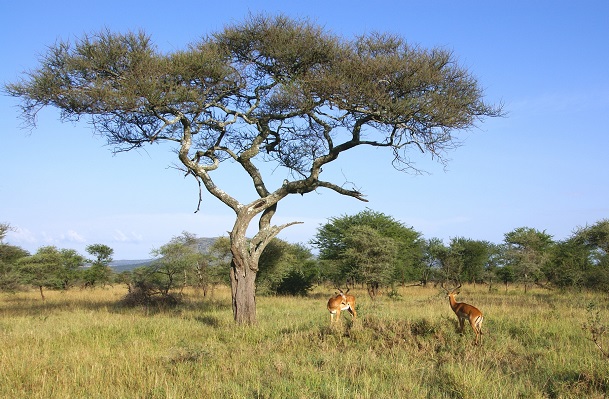-
About
- Our Work
- Get Involved
- Stay Updated

Africas agriculture potential is staggering. The region has about 60 percent of the worlds uncultivable arable land. Some 50 years ago, it was a net exporter of agriculture produce. These potentials have helped foster economic growth and sustained livelihoods.
But the trend has changed. In a dramatic turn-around, Africa today imports more food than it produces to feed itself. Agricultural exports have shrunk and now accounts for just 2 percent of world agricultural exports. This change has come with greater costs. The lives of about 70 percent of rural people who depend extremely on agriculture are at risk to extreme poverty and food insecurity.
Africa is riding the crest of a decade of strong growth, averaging about 5 percent per year. This is impressive. Of course, growth has failed to lift millions of lives out of poverty and food insecurity. The disconnect between high economic growth and poverty reduction continues to baffle policy makers and development partners. This is happening because Africa has not fully harnessed the potentials agriculture has. High international prices for minerals, oil and gas have shifted attention away from agriculture. Now everybody is concentrating on extractive resources from African policy-makers to donor governments to development partners to the grim neglect of agriculture. But we are paying the cost of this neglect. Millions of women, men and children go to sleep on an empty stomach. Malnutrition is ravaging the future of millions of children.
The challenges facing agriculture are enormous. Of these challenges, one stands out. There is chronic underinvestment in agriculture in several countries in sub-Saharan Africa. Today, smallholders still depend on rain for irrigation. They use simple tools denying them the opportunity to increase production. Those who manage to produce under these strained conditions have limited access to market. These challenges are thriving because governments invest very little of their budgets in agriculture.
African governments are aware of the need to expand financial investments in agriculture. They have tied themselves with several declarations meant to boost budgetary allocations to agriculture. But sadly these governments have only managed to implement their own declarations with rhetoric. Today, only 7 countries have fulfilled their commitment set out in the Maputo Declaration in 2003 to spend at least 10 percent of national budgets on agriculture.
For development to happen in Africa, leaders ought to reinvigorate agriculture. They must scale up supports for smallholder farmers, who contribute to more than half of food production in Africa. We cannot afford to squander the abundant potentials of agriculture while we look elsewhere for the solutions to end poverty and hunger. African governments, donors and development partners must increase financial investments in agriculture not only to drive poverty and food insecurity down but at least to fulfil their own commitments set in beautifully-crafted declarations, not least the Millennium Development Goals.
One thing is clear. The economic transformation Africa is looking for cannot be found in gold, diamond, oil and gas. The transformation lies in agriculture. Improving the productivity of agriculture is central to addressing poverty and driving social and economic development.
But what is it about agriculture in Africa today? Agriculture co-exists with poverty and food insecurity because policy-makers have failed to invest. It is time for leaders to rethink their commitments to financing and boosting agriculture. I end with a quote from Jawaharlal Nehru, Indian Statesman and First Prime Minister: Everything can wait but agriculture cannot wait!
The Africa Progress Panel, chaired by former UN Secretary-General Mr. Kofi Annan, launches its Africa Progress Report 2014 May 8 in Abuja, Nigeria on Agriculture, Fisheries and Finance. The report provides extensive policy perspective on the state of agriculture and fisheries in Africa. Stay tune for details. Follow updates on twitter: @africaprogress, facebook:https://www.facebook.com/
africaprogresspanel and webpage: www.africaprogresspanel.orgArticle by: Stephen Yeboah. The author is a Research and Communications Assistant at the Africa Progress Panel Secretariat, based in Geneva. He is also the Managing Editor ofwww.developmentmail.org. He can be reached via: This email address is being protected from spambots. You need JavaScript enabled to view it.
Picture credit: Eva Schuster, gazelles at Serengeti park in Tansania in the evening
About the author
Related Posts
Comments
No comments made yet. Be the first to submit a commentBy accepting you will be accessing a service provided by a third-party external to https://archive.ypard.net/
Get in touch
Email: [email protected]
YPARD Global Coordination UnitHosted by AGRIDEA and the Czech University of Life Sciences Prague
Lausanne, Switzerland and Prague, Czech Republic - Our Work

